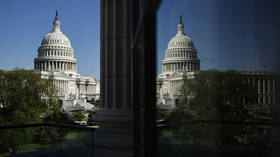‘No consensus’ in West on seizing Russian assets – WaPo

EU officials are reluctant to bow to US pressure and transfer frozen Russian assets to Ukraine, fearing that Moscow’s retaliation would be aimed primarily at the bloc rather than America, the Washington Post reported on Saturday.
As part of unprecedented sanctions over the Ukraine conflict, Western countries have frozen around $300 billion in Russian assets in a move denounced by Moscow as “theft,” with many Western officials suggesting the money could be used to help Ukraine. The bulk of this sum is located in European countries, while the US only holds around $6 billion.
In recent months, there have been several proposals on how to use this money to help Ukraine. While the US has pushed for the more hardline option of outright seizing the funds, the EU has proposed using the profits generated by the assets to help Ukraine. Another option under discussion is to use the assets as collateral to secure loans for Kiev.
According to the Post, EU officials are reluctant to confiscate the Russian assets due to concerns that the move “could breach international law, discourage investors from trusting the euro and invite Russian retaliation.”
They have also pushed back against the US proposal to seize the funds as Europe holds most of the frozen assets, and “any Russian retaliation will probably fall on Europe, not the United States.”
According to an unnamed US Treasury official, both the EU and US agree that “more needs to be done for Ukraine, but there is no consensus on specifics.” He added that “we’re thinking of the Russian sovereign assets as a sustainable medium-to-long-term solution for this funding problem.”
The report comes as the US House of Representatives passed the Rebuilding Economic Prosperity and Opportunity for Ukrainians Act (REPO) on Saturday, which could allow the administration of US President Joe Biden to seize Russian assets in US banks and transfer them to Ukraine for reconstruction.
Kremlin spokesman Dmitry Peskov has warned that Russia will not leave the potential seizure unanswered, adding that the move could undermine the principle of the “inviolability of private… and state property,” as well as causing “irreparable damage to the US image.”













